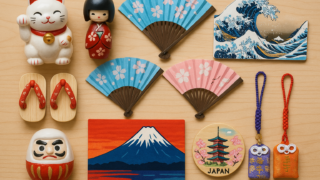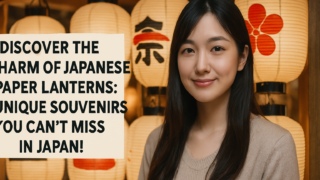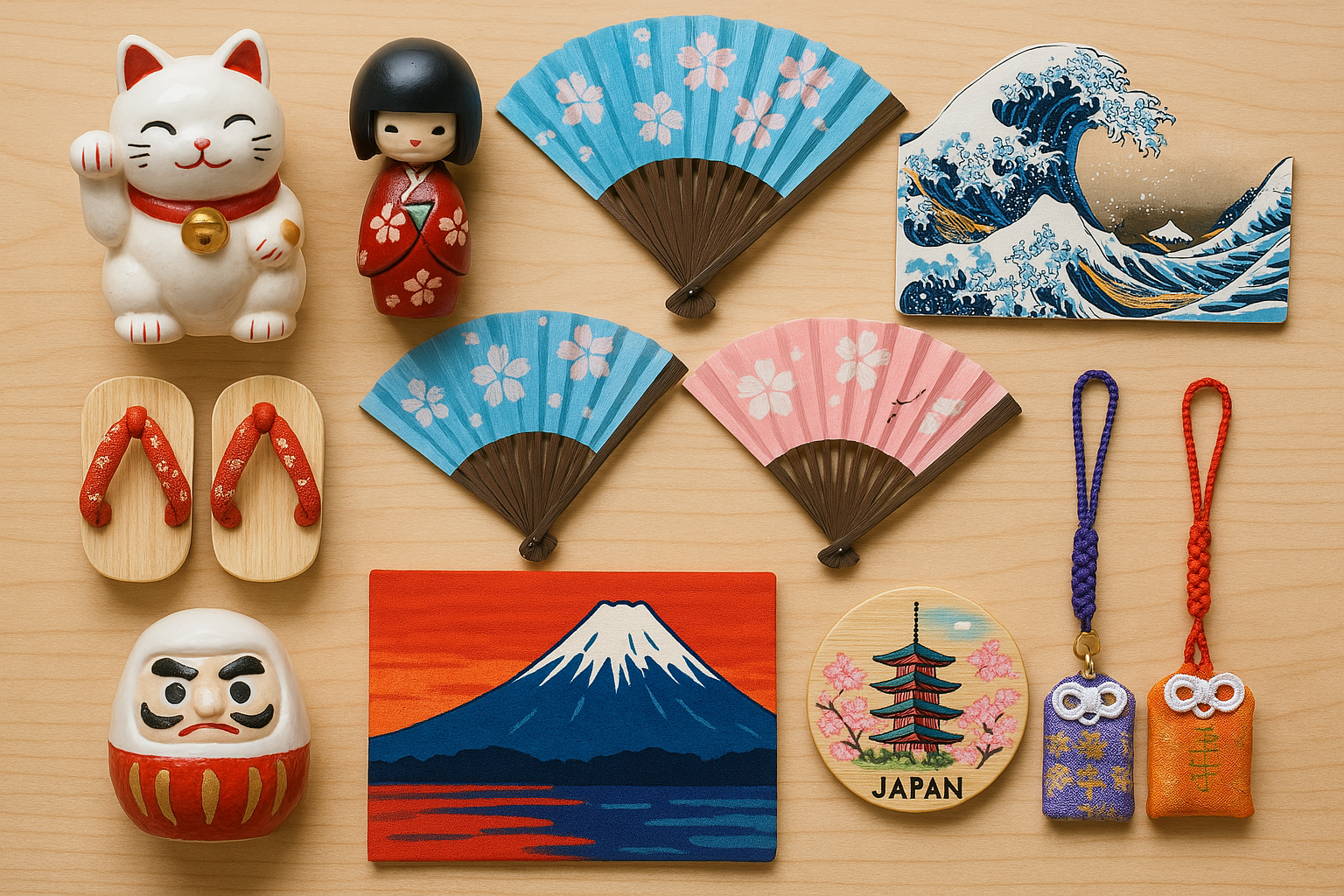10 Japanese Gift Ideas That Foreigners Absolutely Love: Must-Have Souvenirs from Japan
- Introduction: The Magic of Japanese Souvenirs
- 1. Traditional Japanese Kimonos: The Ultimate Souvenir
- 2. Japanese Tea Sets: A Sip of Japan’s Culture
- 3. Japanese Fans (Sensu): Elegant and Practical
- 4. Maneki Neko: The Lucky Cat
- 5. Japanese Sweets (Wagashi): A Taste of Japan
- 6. Japanese Stationery: A Touch of Japanese Precision
- Conclusion: Take a Piece of Japan Home
Introduction: The Magic of Japanese Souvenirs
When visiting Japan, the art of souvenir shopping is almost as exciting as the sightseeing itself. Whether you’re strolling through the neon-lit streets of Tokyo or the ancient temples of Kyoto, there’s always something unique to bring home. But what makes a souvenir from Japan so special? Is it the craftsmanship? The cultural significance? Or perhaps the simple fact that it’s unlike anything you can find at home? In this article, we’ll dive into 10 of the most-loved Japanese gift ideas that foreigners absolutely adore, and yes, they are as fun as they sound! So, get ready to explore the best keepsakes that will forever remind you of the Land of the Rising Sun!
1. Traditional Japanese Kimonos: The Ultimate Souvenir
If you think of Japan, chances are that the iconic kimono comes to mind. A traditional Japanese garment, the kimono is as much a symbol of Japan as sushi or sumo wrestling. With its beautiful fabric, intricate designs, and elegant silhouette, a kimono is a must-have souvenir. But here’s the thing—while you may not wear it every day, the kimono makes for an exquisite gift or a fabulous addition to your collection. And let’s be honest, who doesn’t want to dress like a samurai or a geisha, even if it’s just for a photoshoot?
Why Kimonos are a Favorite Gift
Kimonos are timeless pieces of art that celebrate Japanese tradition. The colorful patterns and fine silks tell stories of nature, folklore, or the changing seasons. A kimono can range from a casual yukata (perfect for summer festivals) to a more formal, elaborately embroidered garment for special occasions. Imagine the smiles and awe when you present a kimono to a loved one. It’s a gift that doesn’t just speak of Japan—it whispers the beauty and elegance of an entire culture.
Where to Buy Kimonos in Japan
Looking to get your hands on a kimono? Kyoto is the heart of traditional kimono culture, with many shops offering rentals and sales. You’ll find beautiful kimonos in the Gion district, where the traditional Geisha culture thrives. If you’re in Tokyo, head to Asakusa, where you can shop for everything from yukatas to high-end kimonos. Just be sure to check the fabric and quality—some kimonos can be pricey, but trust me, they’re worth every yen.
2. Japanese Tea Sets: A Sip of Japan’s Culture
Tea drinking in Japan is an art, and so is the tea set that accompanies it. With an endless array of beautifully crafted teapots, cups, and accessories, Japanese tea sets make perfect souvenirs. They aren’t just functional; they’re miniature works of art that elevate your tea-drinking experience to a whole new level. Imagine sipping your morning matcha from a hand-painted, porcelain cup while reflecting on your Japan adventure. It’s not just a drink—it’s a ritual.
The Elegance of Japanese Tea Culture
Japanese tea culture isn’t only about the tea—it’s about the experience. From the preparation of matcha to the presentation of the tea itself, every step is carefully thought out. The tea set you purchase will likely feature elegant designs that showcase Japanese aesthetics, such as cherry blossoms or bamboo. And, much like the tea ceremony itself, the right tea set will help you slow down and enjoy a quiet moment, whether you’re hosting a guest or simply unwinding at home.
Popular Tea Sets and Where to Find Them
Kyoto, with its rich cultural heritage, is the best place to find authentic tea sets. Look for ceramic teapots in various hues of green, blue, and brown. If you’re in Tokyo, take a stroll through department stores like Mitsukoshi in Ginza for top-quality sets. But if you want something more rustic, head to small shops in Kanazawa, where you’ll find handmade, minimalist tea sets crafted by local artisans.
3. Japanese Fans (Sensu): Elegant and Practical
Want to bring back something that’s both practical and beautiful? Enter the world of Japanese fans, specifically the sensu, or folding fan. These delicate pieces of craftsmanship come in all shapes and sizes, often decorated with beautiful floral or seasonal designs. But they’re not just for decoration—fans were originally used to keep cool during Japan’s hot and humid summers. Talk about function and style!
Why Japanese Fans Make Perfect Gifts
Fans make great gifts because they are incredibly versatile and come in various price ranges. Whether you’re looking for something simple and inexpensive or a finely crafted, hand-painted fan, you’ll find it in Japan. These fans are portable, lightweight, and fun to collect, plus they can be folded up and tucked into your bag for easy storage—perfect for the souvenir hunter on the go!
Where to Buy Sensu Fans in Japan
Kyoto and Tokyo both boast excellent options for purchasing fans. Kyoto’s shops along the Philosopher’s Path often carry high-quality sensu, and in Tokyo’s Asakusa, you’ll find both traditional and modern fans that make great gifts. Whether you choose a painted fan that captures the beauty of a Japanese garden or a more minimalist design, you’re sure to find something that catches your eye!
4. Maneki Neko: The Lucky Cat
There’s a popular saying in Japan, “Good fortune never knocks twice.” But with the maneki neko—Japan’s lucky cat figurine—you can have good luck coming your way any time! This charming figurine, often depicted with a raised paw, is said to bring wealth, good health, and prosperity. Whether it’s sitting at the entrance of a restaurant, store, or home, the maneki neko is a symbol of good things to come.
The Symbol of Good Fortune
The maneki neko’s history dates back to the Edo period, and it has since become a beloved symbol of good luck throughout Japan and the world. You’ll spot these cheerful cats in various colors, each symbolizing a different kind of luck. A gold maneki neko is believed to attract wealth, while a white one brings good health. And let’s face it, who wouldn’t want a little good luck in their life?
Different Styles of Maneki Neko
Maneki neko can be found in all sizes, from tiny ones that fit in your pocket to life-sized versions that stand tall in shop windows. If you’re a fan of quirky souvenirs, you can find modern takes on the traditional cat, from those holding items like sushi to ones that double as a coin bank. Be sure to grab a maneki neko to add a touch of fun and fortune to your home!
5. Japanese Sweets (Wagashi): A Taste of Japan
Sweet tooth? You’re in for a treat—literally. Wagashi, Japan’s traditional sweets, are as much a feast for the eyes as they are for the taste buds. These delicate confections are often made with ingredients like sweet bean paste, mochi, and agar-agar. You’ll find them beautifully shaped to represent nature, such as flowers, leaves, and even animals. Each bite is a little taste of Japan’s tradition and artistry.
Delicate Japanese Confections
Wagashi are more than just sweets—they’re a form of edible art. Often crafted for special occasions like the Japanese New Year or tea ceremonies, these desserts come in colors and shapes that reflect the changing seasons. Whether it’s the soft, chewy texture of mochi or the sweet, smooth filling of dorayaki, wagashi brings a bit of Japan’s culture and history to life.
Popular Wagashi to Bring Home
If you want to bring a piece of Japan’s culinary tradition home, try some popular wagashi like yokan (sweet jellied bean paste), dorayaki (bean-filled pancakes), or a box of seasonal mochi. These sweets make for an elegant and unique souvenir, and you can often find them in beautifully wrapped boxes that make them look even more special.
6. Japanese Stationery: A Touch of Japanese Precision
Japan is known for its attention to detail, and nowhere is that more evident than in its stationery. From beautifully designed pens to perfectly crafted notebooks, Japanese stationery is often made with the finest materials and meticulous care. These products are beloved not only for their function but also for their elegant designs.
The Craftsmanship Behind Japanese Stationery
When you hold a Japanese pen or notebook in your hand, you can feel the difference. The smoothness of the pen, the crispness of the paper—it’s an experience in itself. Whether you’re looking for a simple pen or a luxury fountain pen, Japan’s stationery will add a touch of elegance to your writing routine. It’s the perfect gift for anyone who appreciates quality craftsmanship.
Where to Buy Japanese Stationery
If you’re in Tokyo, a visit to the Kanda area, known for its vast collection of bookstores and stationery shops, is a must. For a more premium experience, check out Itoya in Ginza, which has an impressive collection of high-end pens, paper, and other stationery goods. And don’t forget to pick up some washi tape—these decorative tapes are fun, colorful, and come in endless designs!
Conclusion: Take a Piece of Japan Home
Whether you’re looking for something traditional, functional, or uniquely Japanese, these 10 souvenirs are sure to bring a smile to your face and a memory of your time in Japan. From kimonos to maneki neko, every item has a story to tell and a piece of Japan to share. So, go ahead—take a little bit of Japan home with you!







コメント